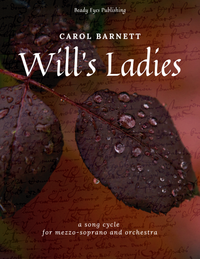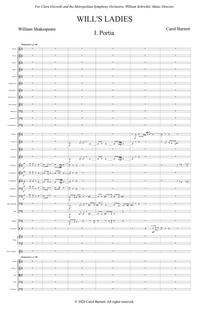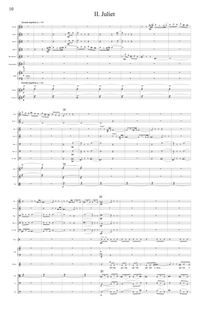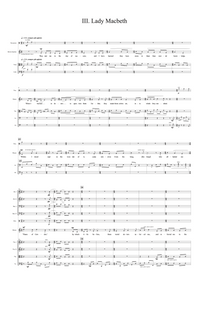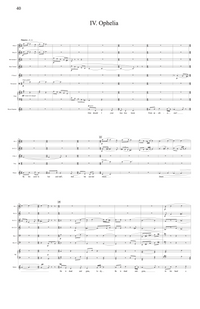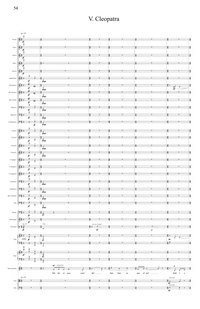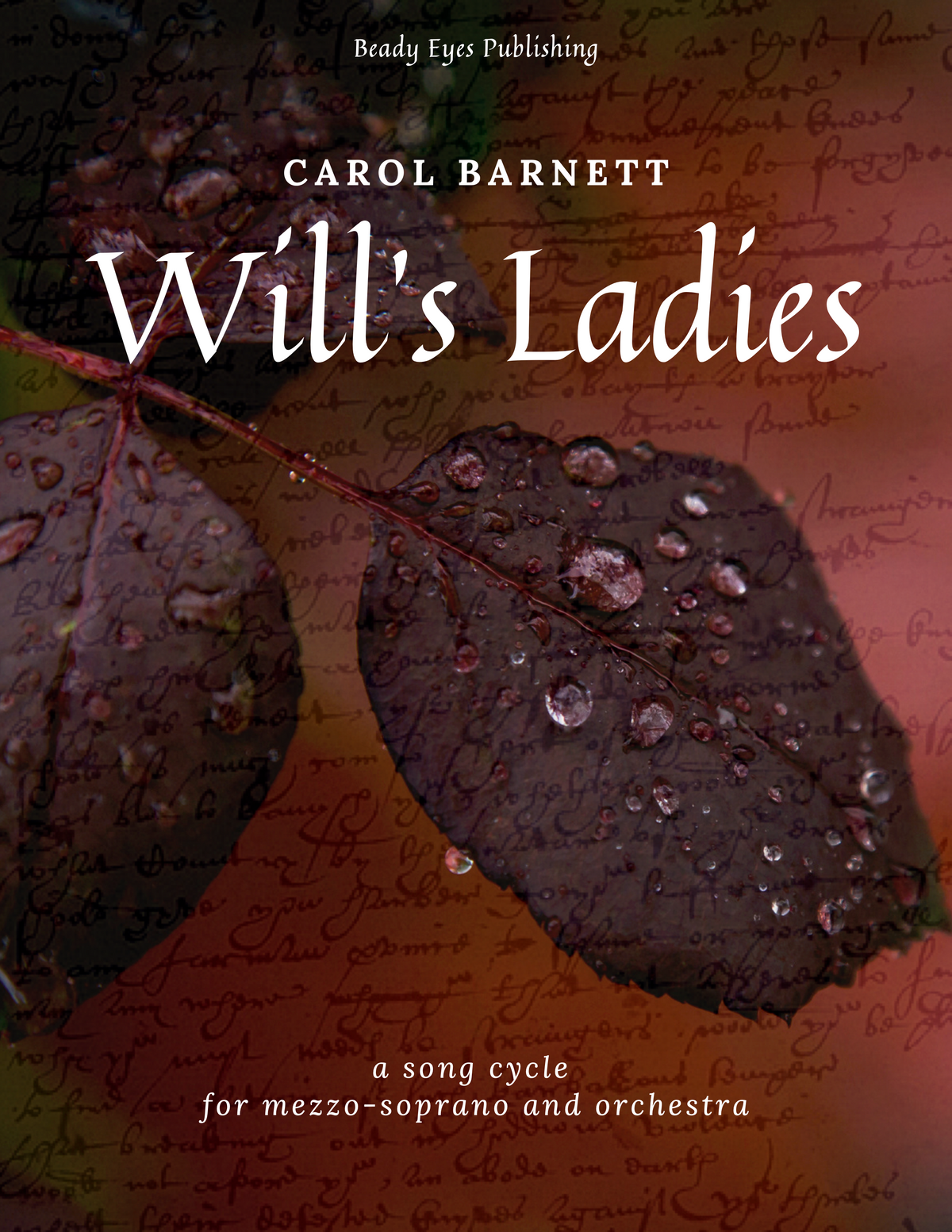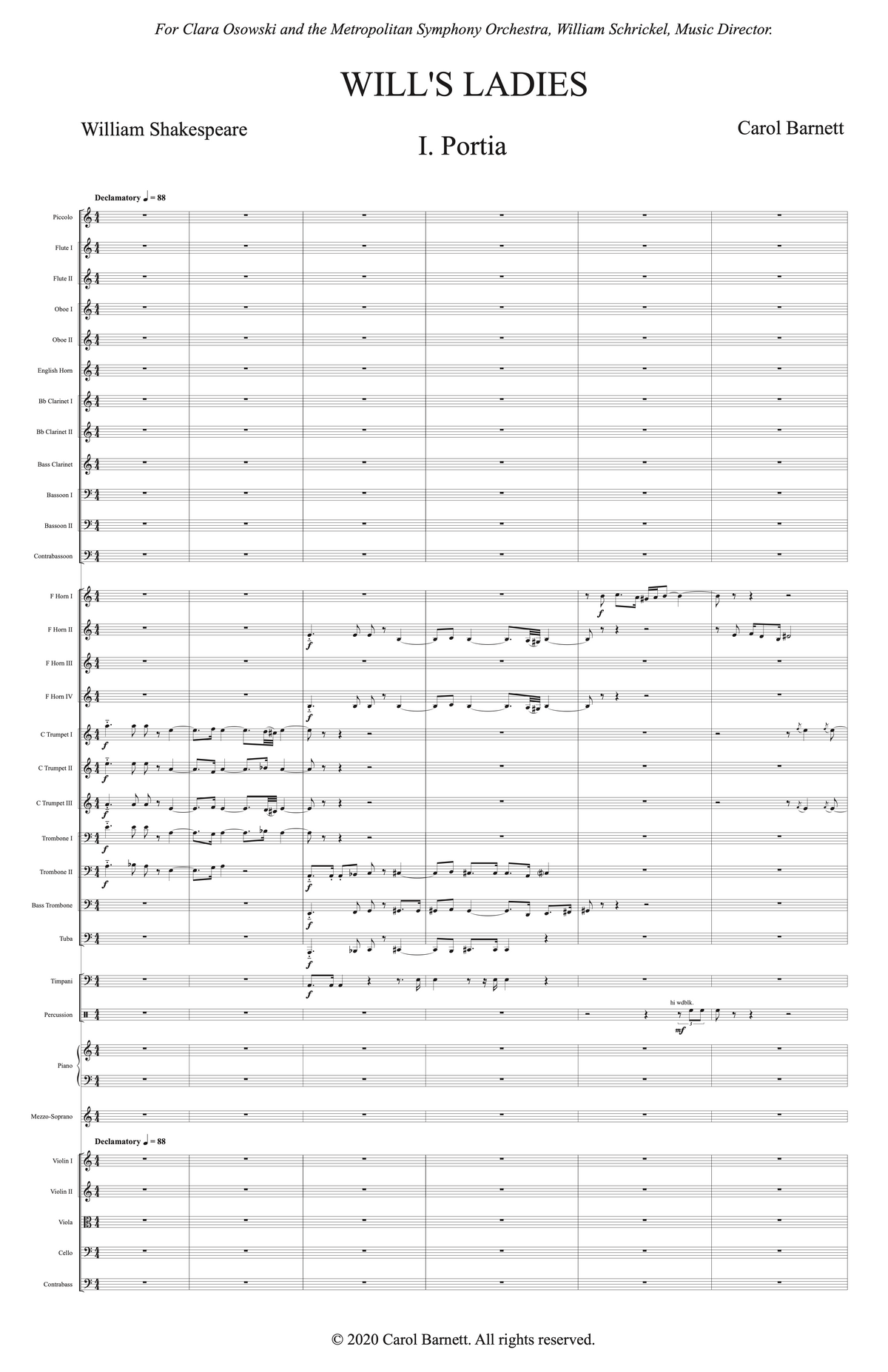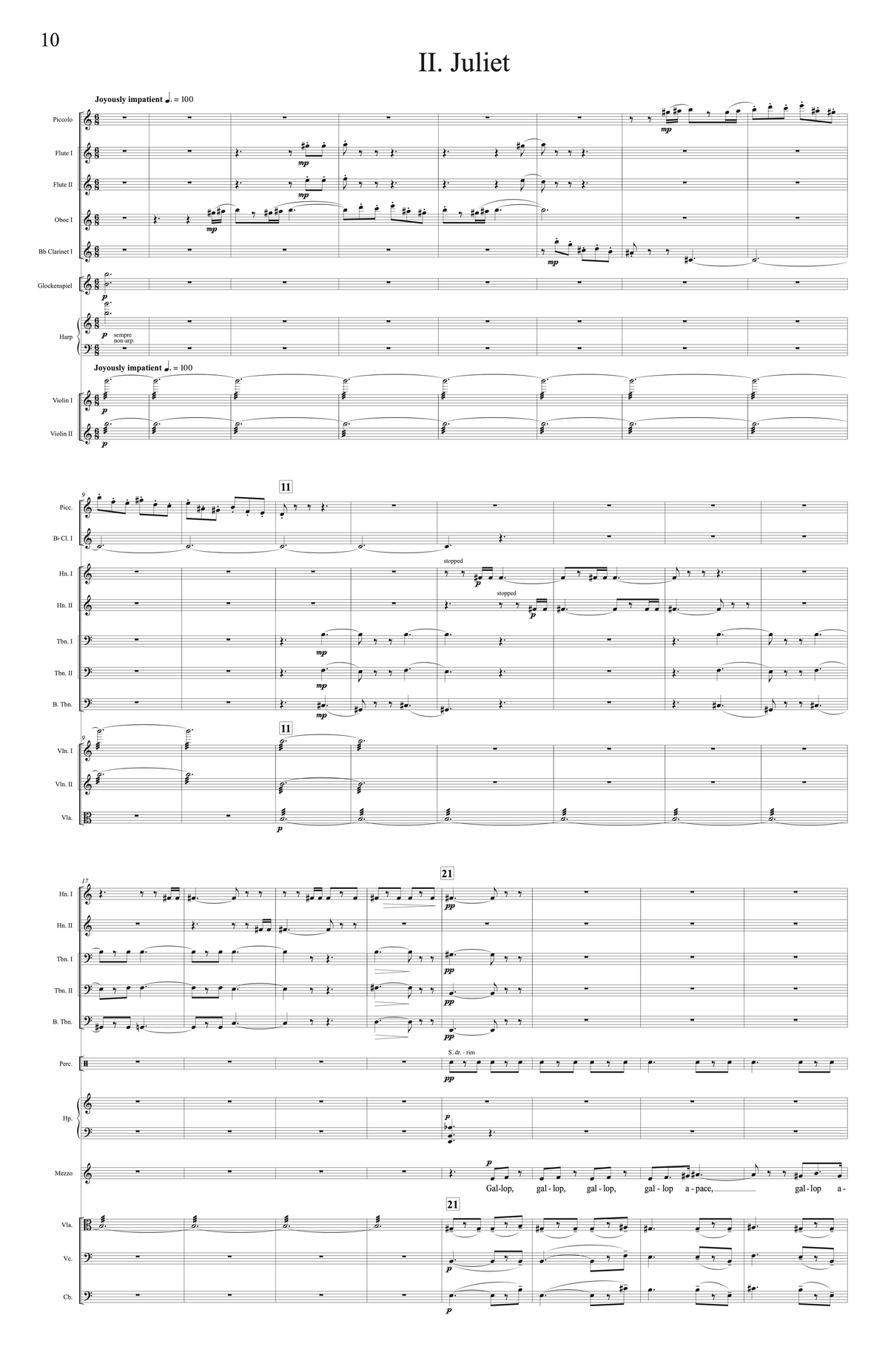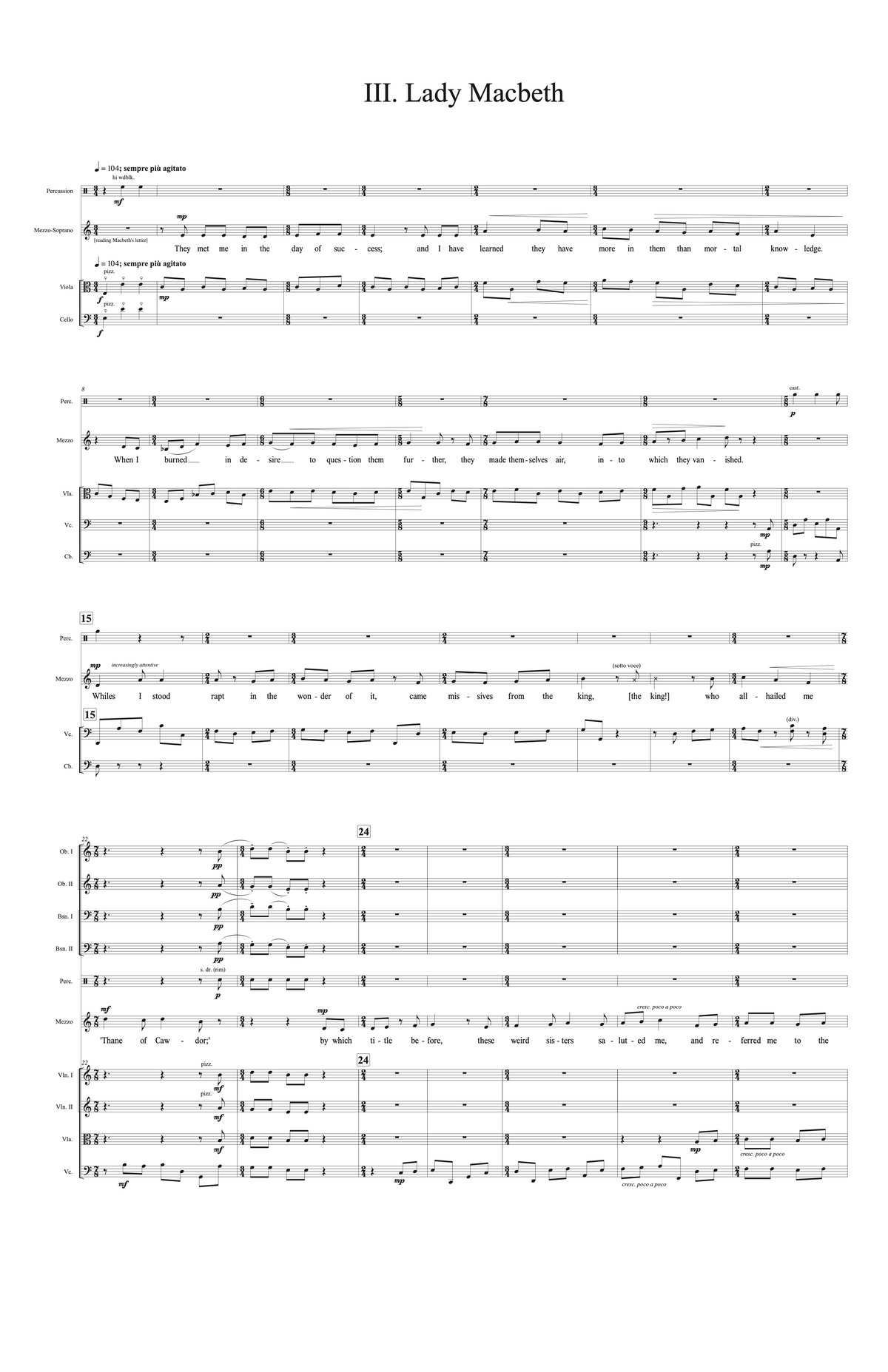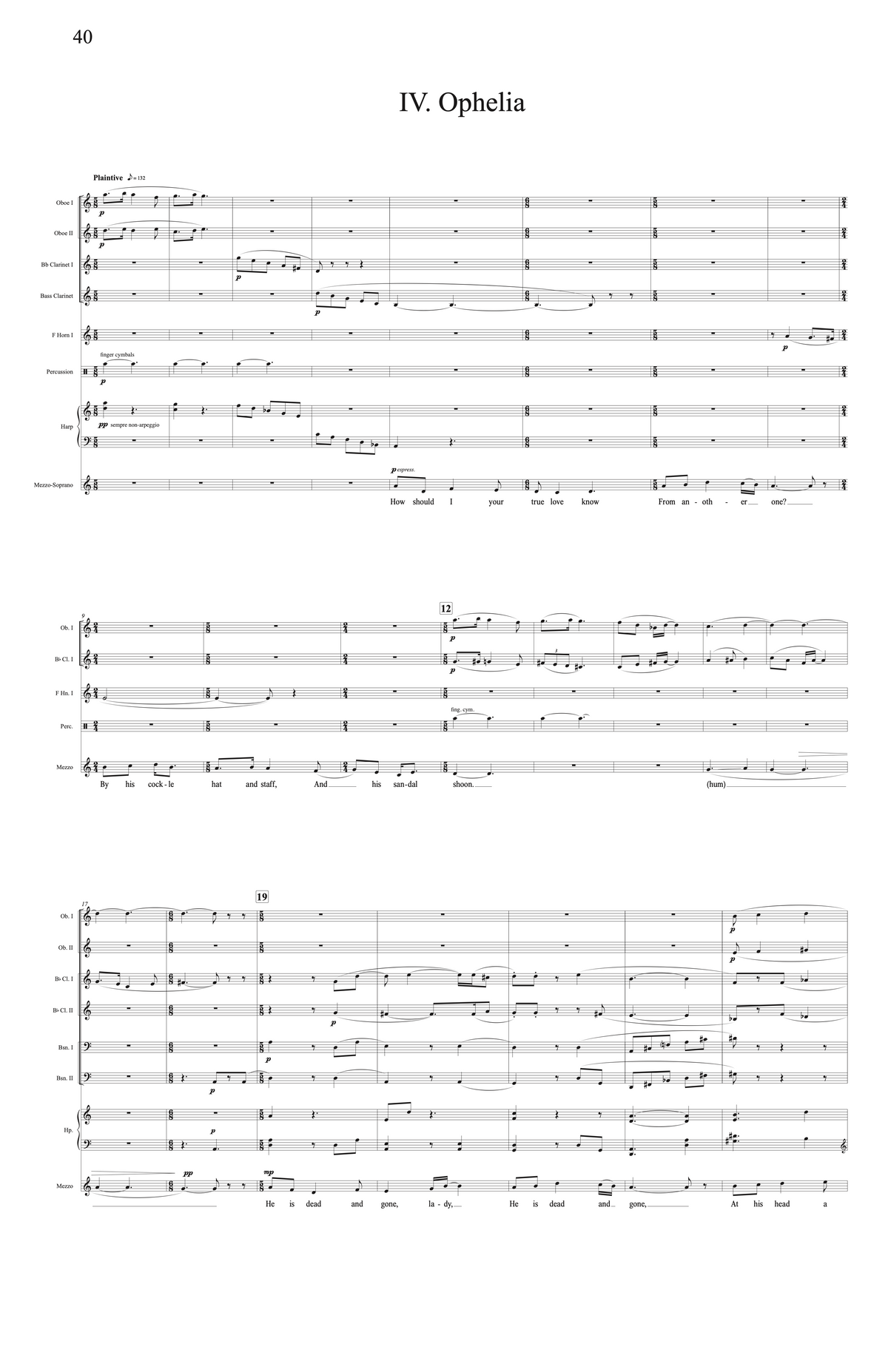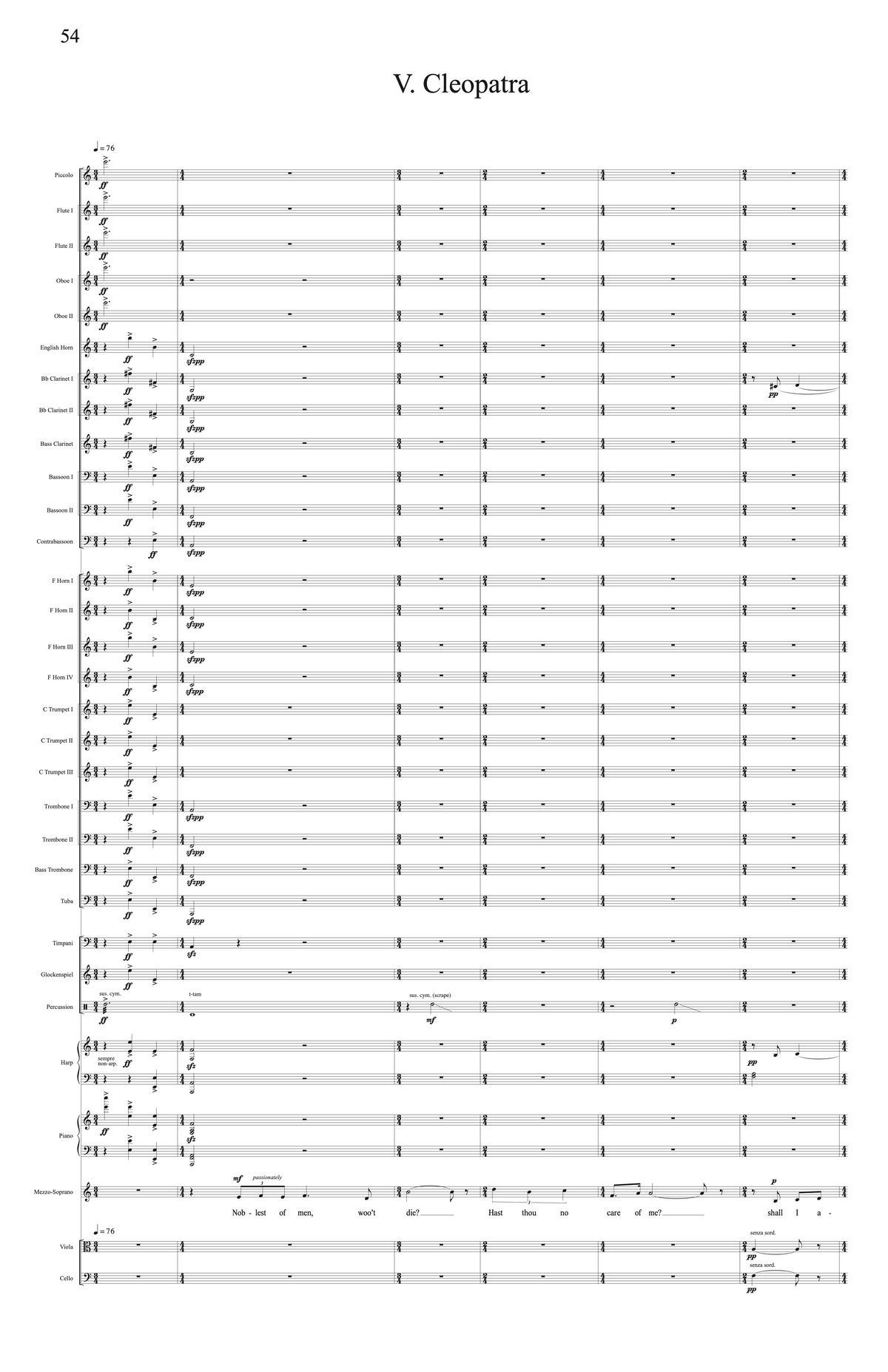Will's Ladies – Carol Barnett
- Regular
- $27.99
- Sale
- $27.99
- Regular
- Unit Price
- per
Composer: Carol Barnett
Text by: Shakespeare
Instrumentation: Mezzo-Soprano and Orchestra (2 Fl, Picc, 2 Ob, EH, 2 Cl, B Cl, 2 Bsn. C Bsn, 4 Hn, 3 Trp, 2 Trb, B Trb, Tuba, Timp, Glock, Mba, Perc (hi wdbk, hi & low toms, s dr, b dr, cast, fing cym, tri, bell tree, sus cym, sizz cym, glass wind chimes, t-tam, sleigh bells), Harp, Pno, Mezzo Sop, Str)
Duration: Approx. 20 minutes
Date Written: 2020
Composer’s note:
Will’s Ladies illuminates five of Shakespeare’s most memorable women:
A brass flourish announces PORTIA’s courtroom speech. Two horns mimic the preliminary dialog: “Then must the Jew be merciful.” “On what compulsion must I? Tell me that.” Then, gently at first: “The quality of mercy is not strained.”
JULIET enters, joyfully impatient for the day to run its course. Eagerness deepens into sensual yearning as she anticipates the onset of night and the arrival of Romeo. The movement is an homage to my teacher, Dominick Argento, who set the same text in his Variations for Orchestra (The Mask of Night).
LADY MACBETH reads a letter from her husband telling of the three witches who have addressed him as “king that shall be.” The music turns increasingly foreboding as she ruthlessly assesses his inadequacy and plots to realize the witches’ prediction herself.
Deranged OPHELIA sings disconsolately of loss, the death of her father, Hamlet’s seeming betrayal, and herbals for thoughts and memories.
CLEOPATRA mourns Antony’s death and, knowing that Caesar will soon capture her, prepares herself for a royal death, taking up the asp – “poor venomous fool” – determined to rob him of that triumph.
texts
PORTIA
The Merchant of Venice: Act IV, Scene 1
[Portia: Then must the Jew be merciful.
Shylock: On what compulsion must I? Tell me that.]
Portia: The quality of mercy is not strained.
It droppeth as the gentle rain from heaven
Upon the place beneath. It is twice blest:
It blesseth him that gives and him that takes.
‘Tis mightiest in the mightiest; it becomes
The thronèd monarch better than his crown.
His scepter shows the force of temporal power,
The attribute to awe and majesty
Wherein doth sit the dread and fear of kings;
But mercy is above this scepter’d sway.
It is enthronèd in the heart of kings;
It is an attribute to God himself;
And earthly power doth then show likest God’s
When mercy seasons justice. Therefore, Jew,
Though justice be thy plea, consider this:
That in the course of justice none of us
Should see salvation. We do pray for mercy,
And that same prayer doth teach us all to render
The deeds of mercy.
JULIET
Romeo and Juliet: Act III, Scene 2
Gallop apace, you fiery-footed steeds,
Towards Phoebus' lodging; such a waggoner
As Phaeton would whip you to the west
And bring in cloudy night immediately.
Spread thy close curtain, love-performing night,
That rude day’s eyes may wink, and Romeo
Leap to these arms, untalk’d of and unseen.
Lovers can see to do their amorous rites
By their own beauties: or if love be blind,
It best agrees with night. Come, civil night,
Thou sober-suited matron, all in black,
And learn me how to lose a winning match
Play’d for a pair of stainless maidenhoods:
Hood my unmann’d blood, bating in my cheeks,
With thy black mantle; till strange love, grown bold,
Think true love acted simple modesty.
Come, night; come, Romeo, come, thou day in night;
For thou wilt lie upon the wings of night
Whiter than new snow upon a raven’s back.
Come, gentle night, come, loving, black-brow’d night,
Give me my Romeo; and when he shall die,
Take him and cut him out in little stars,
And he will make the face of heaven so fine
That all the world will be in love with night…
LADY MACBETH
Macbeth: Act I, Scene 5
(reading a letter) They met me in the day of success; and I have learned they have more in them than mortal knowledge. When I burned in desire to question them further, they made themselves air, into which they vanished. Whiles I stood rapt in the wonder of it, came missives from the king, who all-hailed me, ‘Thane of Cawdor;’ by which title, before, these weird sisters saluted me, and referred me to the coming on of time, with ‘Hail, king that shall be!’ This have I thought good to deliver thee, my dearest partner of greatness, that thou mightest not lose the dues of rejoicing, by being ignorant of what greatness is promised thee. Lay it to thy heart, and farewell.
Glamis thou art, and Cawdor; and shalt be
What thou art promis’d. Yet do I fear thy nature;
It is too full o’ the milk of human kindness
To catch the nearest way; thou wouldst be great,
Art not without ambition, but without
The illness should attend it…
Hie thee hither,
That I may pour my spirits in thine ear,
And chastise with the valour of my tongue
All that impedes thee from the golden round,
Which fate and metaphysical aid doth seem
To have thee crown’d withal…
Come, you spirits
That tend on mortal thoughts, unsex me here,
And fill me from the crown to the toe top full
Of direst cruelty; make thick my blood,
Stop up the access and passage to remorse,
That no compunctious visitings of nature
Shake my fell purpose…
Come, thick night,
And pall thee in the dunnest smoke of hell,
That my keen knife see not the wound it makes,
Nor heaven peep through the blanket of the dark,
To cry, ‘Hold, hold.’
OPHELIA
Hamlet: Act IV, Scene 5
How should I your true love know
From another one?
By his cockle hat and staff,
And his sandal shoon.
*****
He is dead and gone, lady,
He is dead and gone,
At his head a grass-green turf,
At his heels a stone.
*****
White his shroud as the mountain snow—
Larded all with sweet flowers,
Which bewept to the ground did go
With true-love showers.
*****
Lord, we know what we are, but know not what we may be.
*****
Tomorrow is Saint Valentine’s day,
All in the morning betime,
And I a maid at your window,
To be your Valentine.
Then up he rose and donned his clo’es
And dupp’d the chamber door;
Let in the maid, that out a maid
Never departed more.
Quoth she, “Before you tumbled me,
You promised me to wed.”
“So would I ha' done, by yonder sun,
An thou hadst not come to my bed.”
We must be patient; but I cannot choose but weep, to think they should lay him i’ the cold ground.
*****
They bore him barefac’d on the bier,
Hey no nonny, nonny, hey nonny.
And on his grave rain’d many a tear,
Down, a-down, an you call him a-down-a.
*****
His beard was as white as snow,
All flaxen was his poll.
He is gone, he is gone,
And we cast away moan,
God ha' mercy on his soul!
*****
There’s rosemary, that’s for remembrance…
And there is pansies, that’s for thoughts…
There’s a daisy. I would give you some violets, but they withered all when my father died.
CLEOPATRA
Antony and Cleopatra: Act IV, Scene 4; Act V, Scene 2
Noblest of men, woo’t die?
Hast thou no care of me? shall I abide
In this dull world, which in thy absence is
No better than a sty? O, see, my women,
The crown o’ the earth doth melt. My lord!
*****
Our lamp is spent, it’s out! Good sirs, take heart:
We’ll bury him; and then what’s brave, what’s noble,
Let’s do it after the high Roman fashion,
And make death proud to take us. Come, away:
This case of that huge spirit now is cold:
Ah, women, women! Come; we have no friend
But resolution and the briefest end.
*****
Give me my robe, put on my crown; I have
Immortal longings in me: now no more
The juice of Egypt’s grape shall moist this lip:
Yare, yare, good Iras; quick. Methinks I hear
Antony call; I see him rouse himself
To praise my noble act; I hear him mock
The luck of Ceasar, which the gods give men
To excuse their after wrath. Husband, I come:
Now to that name my courage prove my title!
I am fire and air; my other elements
I give to baser life.
…Come, thou mortal wretch,
With thy sharp teeth this knot intrinsicate
Of life at once untie: poor venomous fool,
Be angry and dispatch.
…O Antony!

